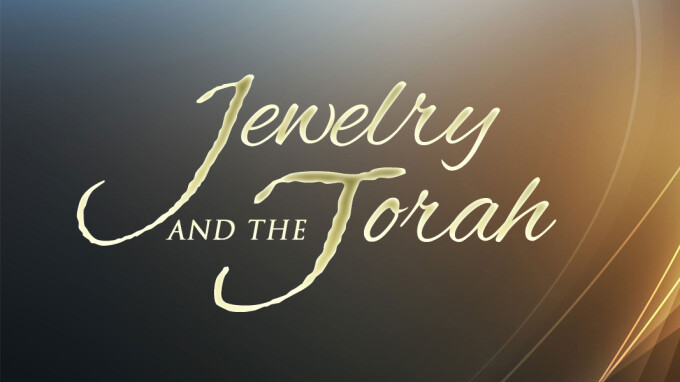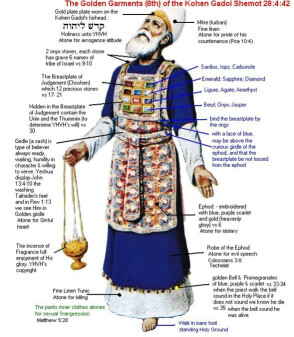Jewelry and the Torah

“You can’t wear that! It’s a sin!”
For some people, hearing such words may be horrifying; they may feel shame or even fear depending upon how they’ve been brought up or what they have been taught in their religion. Last year we wrote a blog post relating to modesty and lust. You can read that post here “Modesty and Lust, Who’s Responsible?” This time around we want to take a look at another modesty related topic, the wearing of jewelry. Within Christianity there was a big push in the 1980s against women wearing make-up and jewelry. The same restrictions are still found in some denominations today. We are only going to take a fairly high level view of the topic in this post.
Is there Scriptural Background to Support No Jewelry?
Do they have any Scriptural background to support this claim? Yes, they do…in a manner of speaking. There are three primary verses used to support this belief.
Exodus 33:5 (ESV)
For YHWH had said to Moses, “Say to the people of Israel, ‘You are a stiff-necked people; if for a single moment I should go up among you, I would consume you. So now take off your ornaments, that I may know what to do with you.’”
Exodus 33:5 is used to show that YHWH is against jewelry and that it is somehow bad for us and relates us to being stiff-necked people.
1 Timothy 2:9-10 (ESV)
likewise also that women should adorn themselves in respectable apparel, with modesty and self-control, not with braided hair and gold or pearls or costly attire, but with what is proper for women who profess godliness—with good works.
1 Peter 3:3-5 (ESV)
Do not let your adorning be external—the braiding of hair and the putting on of gold jewelry, or the clothing you wear—but let your adorning be the hidden person of the heart with the imperishable beauty of a gentle and quiet spirit, which in God's sight is very precious. For this is how the holy women who hoped in God used to adorn themselves, by submitting to their own husbands
1 Timothy 2:9-10 and 1 Peter 3:3 are said to show that Paul taught us that women should not braid their hair or wear jewelry because their beauty should be coming from within.
There are other reasons and verses cited as well, but these are three of the more prevalent ones used over the years. However, if there was really a prohibition against wearing jewelry, then there is a lot of sin going on, even from the Father.
Isaiah 61:10 (ESV)
I will greatly rejoice in the Lord; my soul shall exult in my God, for he has clothed me with the garments of salvation; he has covered me with the robe of righteousness, as a bridegroom decks himself like a priest with a beautiful headdress, and as a bride adorns herself with her jewels.
Ezekiel 16:11-13 (ESV)
And I adorned you with ornaments and put bracelets on your wrists and a chain on your neck. And I put a ring on your nose and earrings in your ears and a beautiful crown on your head. Thus you were adorned with gold and silver, and your clothing was of fine linen and silk and embroidered cloth. You ate fine flour and honey and oil. You grew exceedingly beautiful and advanced to royalty.
Ezekiel 28:13-17 (ESV)
You were in Eden, the garden of God; every precious stone was your covering, sardius, topaz, and diamond, beryl, onyx, and jasper, sapphire, emerald, and carbuncle; and crafted in gold were your settings and your engravings. On the day that you were created they were prepared. You were an anointed guardian cherub
Luke 15:22 (ESV)
But the father said to his servants, ‘Bring quickly the best robe, and put it on him, and put a ring on his hand, and shoes on his feet.
Daniel 5:29 (ESV)
Then Belshazzar gave the command, and Daniel was clothed with purple, a chain of gold was put around his neck, and a proclamation was made about him, that he should be the third ruler in the kingdom.
Genesis 24:53 (ESV)
And the servant brought out jewelry of silver and of gold, and garments, and gave them to Rebekah. He also gave to her brother and to her mother costly ornaments.
Proverbs 25:12 (ESV)
Like a gold ring or an ornament of gold is a wise reprover to a listening ear.
So if Ezekiel 16 shows YHWH adorning Israel with ornaments, bracelets, earrings, a necklace and ring, then why would we believe we cannot adorn ourselves with jewelry? The answer…is context.
The context we find in Exodus is immediately following the golden calf incident, where Israel made golden calf to serve as their mediator between them and YHWH because Moses had been up on the mountain for 40 days.
Remember, the Israelites had recently plundered the Egyptians when they left, so they had much gold, jewelry, etc. The wealth they took from Egypt was a blessing, but they used some of blessing to create the golden calf. After the events of the golden calf YHWH was still  permitting them to go to the Promised Land, but they were being punished. He was not going to go up with them; He also told them to remove their jewelry, a sign of His blessing. Thus, they were not permitted, at least for a time, to display the blessing of the Creator. We know this was not a permanent prohibition of them wearing jewelry as we saw in the previous verses that YHWH Himself also provided jewelry to Israel. Even the High Priest wore what would be considered extravagant adornment.
permitting them to go to the Promised Land, but they were being punished. He was not going to go up with them; He also told them to remove their jewelry, a sign of His blessing. Thus, they were not permitted, at least for a time, to display the blessing of the Creator. We know this was not a permanent prohibition of them wearing jewelry as we saw in the previous verses that YHWH Himself also provided jewelry to Israel. Even the High Priest wore what would be considered extravagant adornment.
1 Timothy 2 and 1 Peter
The other two verses commonly used in the forbiddance of wearing jewelry are found in 1 Timothy 2 and 1 Peter 3 as mentioned earlier. The key here, again, is the context, first let's review the verses.
1 Timothy 2:9-10 (ESV)
likewise also that women should adorn themselves in respectable apparel, with modesty and self-control, not with braided hair and gold or pearls or costly attire, but with what is proper for women who profess godliness—with good works.
1 Peter 3:3-5 (ESV)
Do not let your adorning be external—the braiding of hair and the putting on of gold jewelry, or the clothing you wear—but let your adorning be the hidden person of the heart with the imperishable beauty of a gentle and quiet spirit, which in God's sight is very precious. For this is how the holy women who hoped in God used to adorn themselves, by submitting to their own husbands
We do not see Paul and Peter forbidding jewelry, rather what we see is them teaching that what matters most is the heart, the spirit. The physical application teaches a spiritual lesson. When a person is concerned mostly about their external appearance, they are focusing on what others think of them and what they look like, in other words they are seeking man’s approval.
Rather, what Paul and Peter are saying is to worry more about what the Father thinks of you, be a living example of the Father. True beauty, just like being a true Jew, comes from within, and not what you have based upon DNA or physical wealth. Those things fade and will pass away; the truth is what matters. Your name, and or reputation, lasts far longer than temporary wealth.
It is better to have a pure, beautiful heart and be less attractive on the outside, than to have the external beauty but your soul is destroyed in the end. Messiah echoed similar sentiments when he said to gaze at the natural beauty of the lilies of the field and not worry about what you have (Luke 12:27-31). They possessed far more natural beauty from their Creator than even King Solomon in all that his wealth could bring. As a child of YHWH living His way, He will provide for you and you will have more than you need as you will be blessed.
Conclusion
When you choose not to follow the Creator and His instructions, there will be curses, and you will be deserving of death. If you worry more about man's approval than YHWH's, then you risk the destruction of your soul (Matthew 10:28). Similarly, when Israel was obedient they received beauty and jewelry. When they were disobedient, they were not permitted to live a life enjoying such blessings.
In the end, the lessons about outward appearance were not about forbidding a person to wear jewelry, they were teaching the deeper lesson to not live a life apart from the Father and His ways. Instead live a life spreading the love of the Father, let it make you beautiful to others. When people see the Father in you, they will be drawn to you, and thus to Him. A beautiful heart and spirit is what we are to desire, an everlasting gift, not the temporary and fading beauty found in a dying body and physical adornments.
We hope that this has blessed you.
Shalom.
